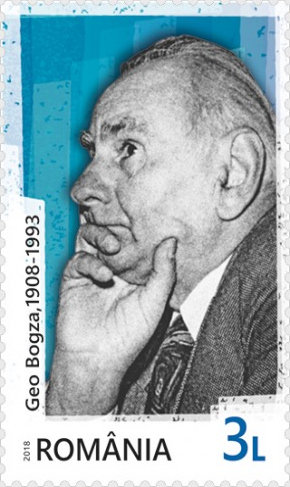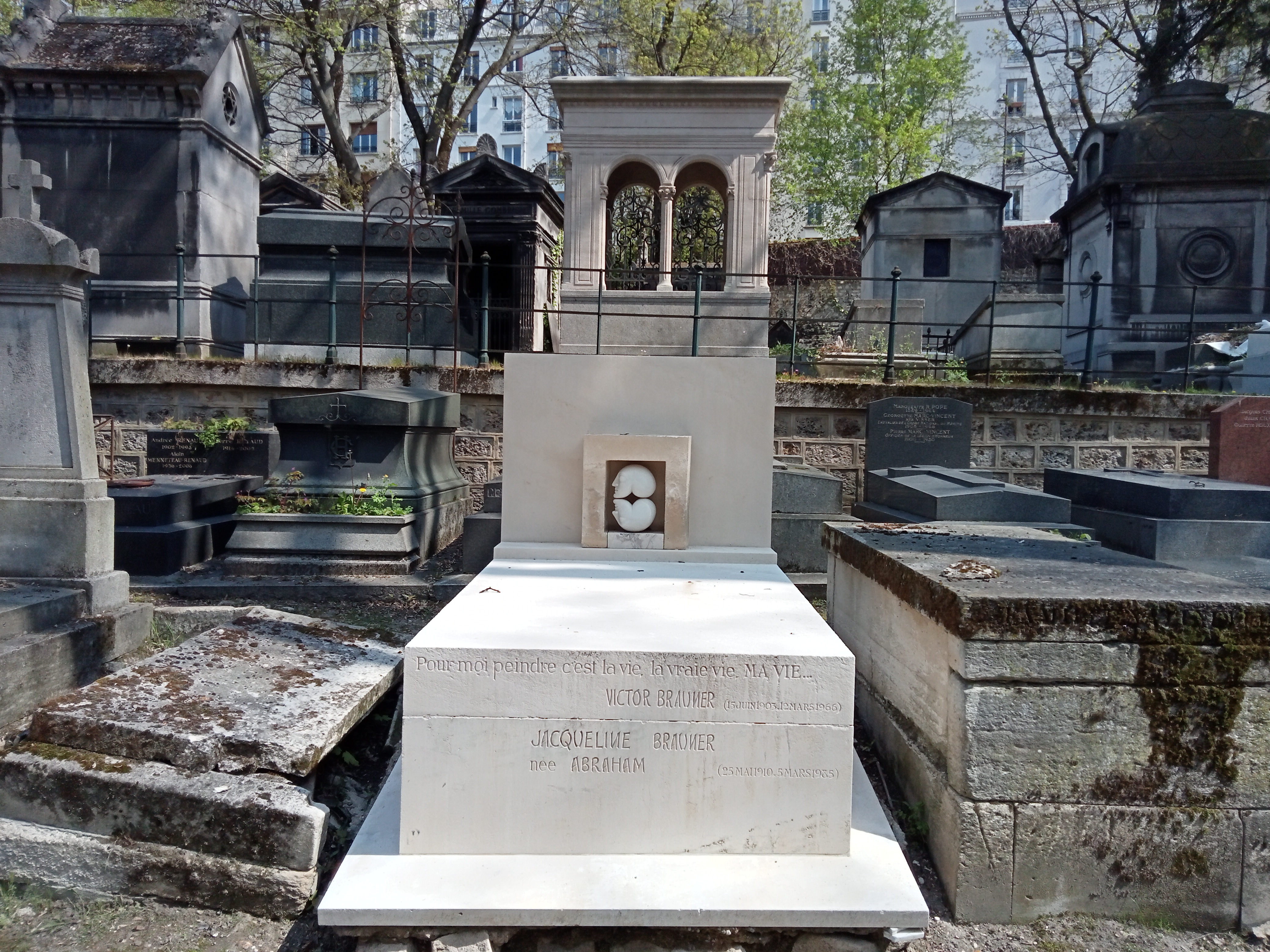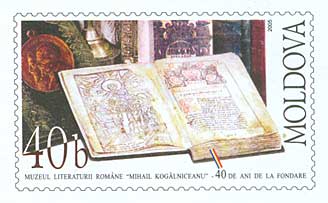|
Geo Bogza
Geo Bogza (; born Gheorghe Bogza; February 6, 1908 – September 14, 1993) was a Romanian avant-garde theorist, poet, and journalist, known for his left-wing and communist political convictions. As a young man in the interwar period, he was known as a rebel and was one of the most influential Romanian Surrealists. Several of his controversial poems twice led to his imprisonment on grounds of obscenity, and saw him partake in the conflict between young and old Romanian writers, as well as in the confrontation between the avant-garde and the far right. At a later stage, Bogza won acclaim for his many and accomplished reportage pieces, being one of the first to cultivate the genre in Romanian literature, and using it as a venue for social criticism. After the establishment of Communist Romania, Bogza adapted his style to Socialist realism, and became one of the most important literary figures to have serviced the government. With time, he became a subtle critic of the regime, espec ... [...More Info...] [...Related Items...] OR: [Wikipedia] [Google] [Baidu] |
Blejoi
Blejoi is a commune in Prahova County, Muntenia, Romania. It is composed of three villages: Blejoi, Ploieștiori, and Țânțăreni. Natives * Geo Bogza Geo Bogza (; born Gheorghe Bogza; February 6, 1908 – September 14, 1993) was a Romanian avant-garde theorist, poet, and journalist, known for his left-wing and communist political convictions. As a young man in the interwar period, he was known ... (1908–1993), avant-garde theorist, poet, and journalist * Constantin Dimitrescu (1847–1928), classic composer and music teacher * Alec Sehon (1924–2018), immunologist * Radu Tudoran (1910–1992), born Nicolae Bogza (brother of Geo), novelist References Blejoi Localities in Muntenia {{Prahova-geo-stub ... [...More Info...] [...Related Items...] OR: [Wikipedia] [Google] [Baidu] |
Communism
Communism (from Latin la, communis, lit=common, universal, label=none) is a far-left sociopolitical, philosophical, and economic ideology and current within the socialist movement whose goal is the establishment of a communist society, a socioeconomic order centered around common ownership of the means of production, distribution, and exchange which allocates products to everyone in the society.: "One widespread distinction was that socialism socialised production only while communism socialised production and consumption." Communist society also involves the absence of private property, social classes, money, and the state. Communists often seek a voluntary state of self-governance, but disagree on the means to this end. This reflects a distinction between a more libertarian approach of communization, revolutionary spontaneity, and workers' self-management, and a more vanguardist or communist party-driven approach through the development of a constitutional s ... [...More Info...] [...Related Items...] OR: [Wikipedia] [Google] [Baidu] |
Victor Brauner
Victor Brauner (, also spelled Viktor Brauner; 15 June 1903 – 12 March 1966) was a Romanian painter and sculptor of the surrealist movement. Early life He was born in Piatra Neamț, Romania, the son of a Jewish timber manufacturer who subsequently settled in Vienna with his family for a few years. It is there that young Victor attended elementary school. When his family returned to Romania in 1914, he continued his studies at the Lutheran school in Brăila. His interests revolved around zoology during that period. He attended the National School of Fine Arts in Bucharest (1916–1918) and Horia Igiroșanu private school of painting. He visited Fălticeni and Balcic, and started painting landscapes in the manner of Paul Cézanne. Then, as he testified himself, he went through all the stages: "Dadaist, Abstractionist, Expressionist". On 26 September 1924, the Mozart Galleries in Bucharest hosted his first personal exhibition. In that period he met poet Ilarie Voronca, together ... [...More Info...] [...Related Items...] OR: [Wikipedia] [Google] [Baidu] |
Romanian Academy
The Romanian Academy ( ro, Academia Română ) is a cultural forum founded in Bucharest, Romania, in 1866. It covers the scientific, artistic and literary domains. The academy has 181 active members who are elected for life. According to its bylaws, the academy's main goals are the cultivation of Romanian language and Romanian literature, the study of the national history of Romania and research into major scientific domains. Some of the academy's fundamental projects are the Romanian language dictionary ('' Dicționarul explicativ al limbii române''), the dictionary of Romanian literature, and the treatise on the history of the Romanian people. History On the initiative of C. A. Rosetti, the Academy was founded on April 1, 1866, as ''Societatea Literară Română''. The founding members were illustrious members of the Romanian society of the age. The name changed to ''Societatea Academică Romînă'' in 1867, and finally to ''Academia Română'' in 1879, during the reign ... [...More Info...] [...Related Items...] OR: [Wikipedia] [Google] [Baidu] |
Romanian Writers' Union
The Writers' Union of Romania (), founded in March 1949, is a professional association of writers in Romania. It also has a subsidiary in Chișinău, Republic of Moldova. The Writers' Union of Romania was created by the communist regime by taking over the former Romanian Writers' Society (''Societatea Scriitorilor Români''), which had been established in 1908. The Union organizes the annual Days and Nights of Literature Festival, and the awarding of the prestigious Ovid Prize for Literature. Presidents * Zaharia Stancu (active, 1949–1956) * Mihail Sadoveanu (honorary, 1949–1956; active, 1956–1961) * Mihai Beniuc (1962–1964) * Demostene Botez (1964–1966) * Zaharia Stancu (1966–1974) * (1974–1978) * George Macovescu (1978–1982) * Dumitru Radu Popescu (1982–1990) * Mircea Dinescu (1990–1996) * (1996–2000) * (2000–2005) * Nicolae Manolescu (2005–) Tudor Arghezi was honorary president from 1962 to 1967, as was Victor Eftimiu in 1972; Ștefan Augustin Doi ... [...More Info...] [...Related Items...] OR: [Wikipedia] [Google] [Baidu] |
România Literară
''România Literară'' is a cultural and literary magazine from Romania. In its original edition, it was founded on 1 January 1855 by Vasile Alecsandri and published in Iași until 3 December 1855, when it was suppressed. The new series appeared on 10 October 1968 as a continuation of ''Gazeta Literară''. It is the Writers' Union of Romania The Writers' Union of Romania (), founded in March 1949, is a professional association of writers in Romania. It also has a subsidiary in Chișinău, Republic of Moldova. The Writers' Union of Romania was created by the communist regime by taki ...'s official magazine. The magazine is based in Bucharest and is published on a weekly basis. Editors-in-chief * Geo Dumitrescu (1968–1970) * Nicolae Breban (1970–1971) * George Ivașcu (1971–1988) * D. R. Popescu (1988–1989) * Nicolae Manolescu (1990–present). References External links Official website 1855 establishments in Europe 1855 establishments in the Ottoman Empire ... [...More Info...] [...Related Items...] OR: [Wikipedia] [Google] [Baidu] |
Viața Românească
''Viața Românească'' (, "The Romanian Life") is a monthly literary magazine published in Romania. Formerly the platform of the left-wing traditionalist trend known as poporanism, it is now one of the Writers' Union of Romania's main venues. The magazine, dedicated to literary and scientific issues, was published from March 1906 to August 1916 and from September 1920 to September 1940, first in Iași and then, after 1930, in Bucharest. The magazine was under the leadership of Constantin Stere (in charge of political content), Paul Bujor and, later, Ioan Cantacuzino (for scientific matters), Garabet Ibrăileanu (until 1933), Mihai Ralea and George Călinescu (for literary matters). Suppressed by the fascist National Legionary State in 1940, ''Viața Românească'' resumed publishing, first in a transitional form, from November 1944 to July 1946, when it was edited by Ralea. Finally, the present magazine was published from July 1948 as a monthly magazine of the Romanian ... [...More Info...] [...Related Items...] OR: [Wikipedia] [Google] [Baidu] |
Subtext
Subtext is any content of a creative work, which is not announced explicitly (by characters or author), but is implicit, or becomes something understood by the audience. Subtext has been used historically to imply controversial subjects without drawing the attention (or wrath) of censors. This has been especially true in comedy; it is also common in science fiction, where it can be easier—and/or safer—to deliver a social critique if, e.g., set in a time other than the (author's) present. Definitions Subtext is content "sub" i.e. "under" (with the sense of "hidden beneath") the verbatim wording; readers or audience must "gather" subtext "reading between the lines" or inferring meaning, a process needed for a clear and complete understanding of the text. A meaning stated explicitly is, by definition not subtext (for lack of hiding), and writers may be criticized for failure artfully to create and use subtext; such works may be faulted as too "on the nose", with the characte ... [...More Info...] [...Related Items...] OR: [Wikipedia] [Google] [Baidu] |
Nicolae Ceaușescu
Nicolae Ceaușescu ( , ; – 25 December 1989) was a Romanian communist politician and dictator. He was the general secretary of the Romanian Communist Party from 1965 to 1989, and the second and last Communist leader of Romania. He was also the country's head of state from 1967, serving as President of the State Council and from 1974 concurrently as President of the Republic, until his overthrow and execution in the Romanian Revolution in December 1989, part of a series of anti-Communist uprisings in Eastern Europe that year. Born in 1918 in Scornicești, Ceaușescu was a member of the Romanian Communist youth movement. Ceaușescu rose up through the ranks of Gheorghe Gheorghiu-Dej's Socialist government and, upon Gheorghiu-Dej's death in 1965, he succeeded to the leadership of the Romanian Communist Party as general secretary. Upon his rise to power, he eased press censorship and openly condemned the Warsaw Pact invasion of Czechoslovakia in his speech on 21 A ... [...More Info...] [...Related Items...] OR: [Wikipedia] [Google] [Baidu] |
Socialist Republic Of Romania
The Socialist Republic of Romania ( ro, Republica Socialistă România, RSR) was a Marxist–Leninist one-party socialist state that existed officially in Romania from 1947 to 1989. From 1947 to 1965, the state was known as the Romanian People's Republic (, RPR). The country was an Eastern Bloc state and a member of the Warsaw Pact with a dominant role for the Romanian Communist Party enshrined in its constitutions. Geographically, RSR was bordered by the Black Sea to the east, the Soviet Union (via the Ukrainian and Moldavian SSRs) to the north and east, Hungary and Yugoslavia (via SR Serbia) to the west, and Bulgaria to the south. As World War II ended, Romania, a former Axis member which had overthrown the Axis, was occupied by the Soviet Union, the sole representative of the Allies. On 6 March 1945, after mass demonstrations by communist sympathizers and political pressure from the Soviet representative of the Allied Control Commission, a new pro-Soviet governmen ... [...More Info...] [...Related Items...] OR: [Wikipedia] [Google] [Baidu] |
Social Criticism
Social criticism is a form of academic or journalistic criticism focusing on social issues in contemporary society, in particular with respect to perceived injustices and power relations in general. Social criticism of the Enlightenment The origins of modern social criticism go back at least to the Age of Enlightenment. According to the historian Jonathan Israel the roots of the radical enlightenment can be found in Spinoza and his circle. Radical enlighteners like Jean Meslier were not satisfied with the social criticism of the time, which was essentially a criticism of religion. The focus of his criticism was the suffering of the peasants. In addition, there was also a criticism of civilization for religious reasons, such as that which emanated from the Quakers in England. Jean-Jacques Rousseau developed a social criticism in his political philosophy which influenced the French Revolution and in his pedagogy. Academic forms The positivism dispute between critical ration ... [...More Info...] [...Related Items...] OR: [Wikipedia] [Google] [Baidu] |
Literature Of Romania
Romanian literature () is literature written by Romanian authors, although the term may also be used to refer to all literature written in the Romanian language. History The development of the Romanian literature took place in parallel with that of a rich Romanian folklore - lyric, epic, dramatic and didactic - which continued in modern times. The Romanian oral literature includes doine (lyric songs), ''balade'' (ballads), hore (dance songs), colinde (carols), ''basme'' (fairy tales), ''snoave'' ( anecdotes), ''vorbe'' (proverbs), and ''ghicitoare'' (riddles). Beginnings The earliest surviving document in Romanian is Neacșu's Letter written in 1521, to the ''jude'' ("judge and mayor") of Brașov, Hans Benkner. Romanian culture was heavily influenced by the Eastern Orthodox Church, the official stance of the Romanian Church being that Orthodoxy was brought to the Romanian land by the Apostle Andrew. According to some modern Romanian scholars, the idea of early Christianisatio ... [...More Info...] [...Related Items...] OR: [Wikipedia] [Google] [Baidu] |



.jpg)
